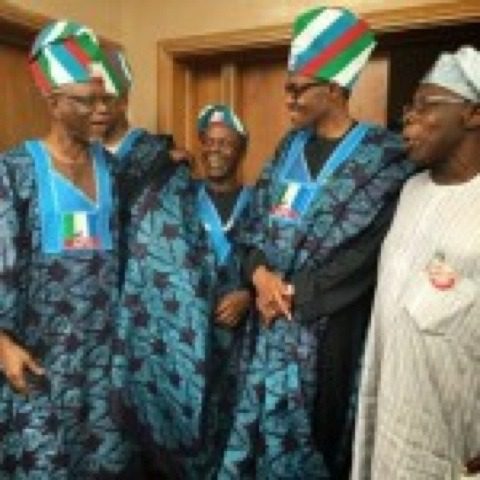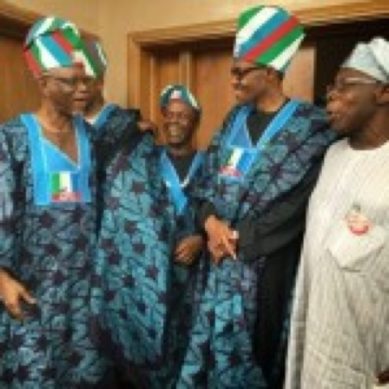Political Issues
Choosing the President’s men -By Ogagaoghene Osadjere


There is nothing said that has never been said. These lines were first penned in 1999 shortly before Olusegun Obasanjo submitted his list of ministerial nominees to the Senate for screening and confirmation. This repeat does not indicate a paucity of new ideas but a lamentation of an ulcer that just won’t go away.
March 21 is a reality in Nigeria. Next date for another reality (or fiction) is September 2015. Since June 2015, politicians have been striving to outdo themselves in establishing who did the most to make May 29, 2015 a reality. We need not stretch our imagination on why this is so because for Nigeria, political participation is not for service but gains. Must this be so?
Hillel, in Ethics of the Fathers, gave a puzzle: “If I am not for myself, who will be for me? If I am only for myself, what am I”. Cicero, in De Officilis (perhaps in reply) noted: “for the administration of government like the office of a trustee, must be conducted for the benefit of those entrusted to one’s care, not of those to whom it is entrusted”.
If this sounds like old school philosophy or Sunday School sermon, hear Harold Lasswell: “Politics is who gets what, when and how”. Anthony Downs was very direct when he went beyond abstract politics to describe politicians as persons who “ act solely in order to attain the income, prestige, and power which come from being in office. Thus, politicians never seek office as a means of carrying out particular policies; their only goal is to reap the rewards of holding office per se. They treat policies purely as the means to the attainment of their private ends, which they reach only by being elected (or appointed)”
It would appear that the politicians’ interpretation of social life is limited to the narrow angle of man’s i for economic bliss. If this view is correct and it appears to be, in Nigeria, and the politician finds himself in a system economic distribution patterns relegate him to the bottom while others who strive less get catapulted to higher rungs of the economic ladder, he would most likely bend the rules in order to reach that rung of economic bliss.
One might argue that in these sappy times, politicians need not be expected to be moral philosophers but undeniably, the electorate has a right to demand some modicum of principled behaviour, some integrity. Let us not forget the essence of creating laws and providing for separation of powers in government is to cause checks and balances; in effect to prevent crime and actualization of self interest at the expense of public interest by any arm of the tripod. But in Nigeria, ample evidence suggests that legislative and organization strategies are repeatedly used to alter or suppress behavior. They never erase the existing vices with which human are variously endowed. Thus rather than hope for protection of the public’s interest through legal or established government processes, the search, the focus should be on psychological insight and moral inquiry. To be lifted out of the crass morass that every Nigerian government since independence has found itself, we must convince the leading symbol of government, the president, to look beyond party pressures, party loyalties, self interests, party interests and avidly seek integrity in choosing his men. Integrity as used here, does not refer to a form of character recently glimpsed in an individual. It means a set of values that has become embedded in the subconscious of the person as to be unassailable no matter the spread and depth of muck and filth in which the possessor is immersed; the person remains the shining untainted core of the environment. It is the way of a lifetime, not of an instant fuelled by consistency of selflessness.
No nation in recorded history, has succeeded in constructing a system of government that is independent of the moral qualities of its leaders. I do recognise the dilemma of the elected or appointed high public office holder. Except where he falls most remarkably within Down’s model, it is safe to assume that he sought the office in the public interest. But can he say the same for others that will become part of pool ostensibly put together for the common will, for the general good? What magic mirror has he to look at that will open the hearts and reason of the men jostling to be his lieutenants? Add to this, the web that surrounds a President who, being elected on a party platform must now live a political life. Frequently, he will find himself caught between what he believes is right and in public interest and what party members, friends and associates wants to be done to ensure continued support and re-election. Is one term ever sufficient to consolidate service? Indeed he becomes an elastic drag in an intricate web of obligations to self, family, party, religion, the people, and the international community. Aah, what a myriad of choices.
Individual virtue would seem to me the only close (to public interest) weapon that the President can wield. Spare us the appearances of minister-nominees before congressional committees where both sides make no bones of what they seek: recognition, patronage and inflated egos. This virtue, best described as “integrity” has been known to be crucial in maintaining responsive and legitimate governments. It has done remarkably well in curbing corruption and rubs off on credibility of government processes. If public officials lack integrity, no legislative reform or sanction can infuse them with it or protect the electorate from the abuses of trust dogging their footsteps. The public tends to lose all that important faith that is needed by government to carry out the hard decisions that involves self-sacrifice in times of economic and political crises.
Joel Fleishman, assessing the political failures in past American governments, had rightly noted that: “nothing – not errors of judgement, not waste, not inefficiency, neven tot high taxes, not over-regulation, not even the loss of a war – so shakes representative government at its roots as does a belief by the public that the officials who govern act chiefly out of concern for their personal interests rather than for the public interest of those who elected them:.
Individual honesty, as opposed to legislative and governmental processes and indoctrination would serve as a handy tool in identification of the suburbia creature who entered politics as an avenue for escape from penury. Such persons are alive in this country. Their consistent sacrifice of self-interest for the public interest is not hidden from those who care to look. Mr. President, let me commend to you, Seneca’s Eleventh Letter to Lucilius: “Cherish some man of high character, and keep him ever before your eyes, living as if he were watching you and ordering all your actions as if he beheld them…we can get rid of most sins if we have a witness who stands near us when we are likely to go wrong. The soul should have someone it can respect … (one whom he can so revere) as to calm and regulate himself by calling him to mind. One who can so revere another, will soon be himself worthy of reverence… for we must have someone according to whom we may regulate our characters; you can never straighten that which is crooked unless you use a ruler”.
As we commence yet another phase of governance, let us reject the dogma of ‘custom’ and pursue unflinchingly, with reawakened interest, the ageless tenets of responsive governance as enunciated by the “Fathers.”


















